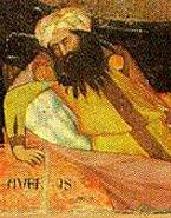
Ibn Rushd (Averroes)
Zaiuddin Sardar, who is the presenter for the BBC Two program on Islam mentioned below, had an interesting and helpful essay in the Toronto Star in July on “The Struggle for Islam’s Soul.” Unfortunately, it does not mention one of my favorite medieval philosophers, Ibn Rushd (Averroes in Latin), who helped to enlighten Europe about the project of philosophy.










QUESTION: Why do left-libertarians despise Christianity, but then always try to “save” Islam?
To Tom: I believe it’s “Ziauddin,” not “Zaiuddin.” He has a lengthy discussion of Ibn Rushd in “Can Science come back to Islam?” (New Scientist, vol. 88, no. 1224, October 1980) — unfortunately not online.
To previous commenter: the premise of your question seems false.
It also does not mention Farabi: the father of Islamic rational philosophy and the philosopher who paved the path for Ibn Rushd.
Yes, it’s not clear to whom the first commentator is directing his rhetorical question. Kais is quite right also to point to the great legacy of al Farabi, as well as Ibn Sinna (Avicenna), who were brilliant points of enlightenment in comparison to the state of knowledge among most of the European Christians at the time. It is a shame that so much of the mainstream of Islamic thought moved away from the embrace of reason, thanks at least in large part to the writings of al Ghazali, with whom Ibn Rushd argued so eloquently.
Rod — thanks for catching the typo. I’m on an iffy internet connection at the moment, but I’ll try to correct it in the original post.
re the Islam-Christianity question: offhand I can’t think of any libertarian writer who has taken the position you describe.
Rose Wilder Lane and Henry Grady Weaver ought to qualify as libertarians who have spoken favorably of elements of both traditions. And Dean Ahmad has written on why Islam, properly understood, is compatible with libertarianism.
And som libertarians, e.g. Thomas Paine and George Smith, have attacked *all* revealed religions as antithetical to liberty.
But which libertarians have condemned Christianity while endorsing Islam?
Actually, Averroes had no effect on Islam or Islam culture. His books were burned and he was banished for a time from Cordova. He did influence Jewish and Christian philosophy. Majid Fakhry’s book on Averroes ends with the many Jewish and Christian philosophers who continued his tradition.
Actually, it seems that before Averroes there was confusion about Aristotle’s ideas due to the fact that several works of neo-Platonists were attributed to Aristotle. Thus, just as Aristotle’s ideas became clear and differentiated from Plato, he was lost to the Islamic world.
One final point, there was no Arab translation of Aristotle’s politics until modern times (see Majid Fakhry.) Thus, the Arab/Islamic philosophers based their political philosophy on Plato’s Republic and The Laws — not exactly libertarian material.
PS Inspiring report on “Building a Free Society in Iraq” in Cato’s Letter. Keep up the good work.
Interesting comments all. I think that Mr. Pappas has overstated the case a bit, as Averroes has had some lasting influence within Islam. He had more influence on European (meaning largely Christian and Jewish) thought, however, as I indicated by describing him as a great man “who helped to enlighten Europe about the project of philosophy.” Aristotle’s politics was not a great source of ideas about liberty generally (although is critique of communism was certainly influential), but his approach to the systematic investigation of nature did help to set the stage for the natural law approaches that were so influential for the development of both positive scientific investigation of society (e.g., economics) and the normative evaluation of behavior (e.g., rights theory).